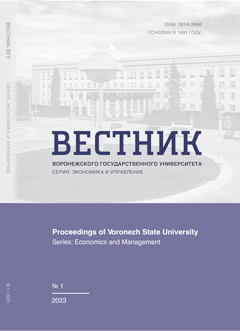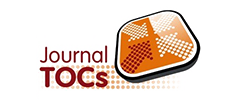Экономика обращения с пищевыми отходами в России
Аннотация
Предмет. Одной из проблем в сфере обращения с отходами в России является исключение пищевых отходов, имеющих наибольшую долю в объеме твердых коммунальных отходов, из процессов раздельного сбора и накопления. Это сохраняет высокие риски загрязнения окружающей среды, повышает затраты обращения с отходами и экономические потери от утраты ценного вторсырья. Негативным фактором в экономике обращения с отходами является логистика, плечо перевозок на всех стадиях обращения обычно велико вследствие отдаленности мест образования от мест переработки и захоронения.
Цель исследования – обоснование решения проблемы обращения с пищевыми отходами в России на основе раздельного сбора, утилизации и переработки. Для разработки необходимого обоснования решения проблемы ставились задачи: анализ состояния обращения с отходами в России; сравнение применяемых способов переработки пищевых отходов; определение путей включения домохозяйств в процесс управления пищевыми отходами; составление транспортной модели расходов по вывозу мусора к местам накопления и переработки; расчет экономии транспортных расходов за счет переработки пищевого компонента в местах его образования.
Методология. Обоснование первоочередного раздельного сбора и переработки пищевых отходов проводится методами моделирования, расчета экономии и факторного анализа влияния раздельного сбора на расходы в сфере управления отходами. Материалами исследования послужили статистические, плановые и отчетные данные, результаты, полученные отечественными и зарубежными исследователями по данной теме.
Результаты. Разработана модель транспортных расходов при раздельном сборе отходов, определено количественное влияние раздельного сбора пищевых отходов на изменение транспортных расходов по вывозу твердых коммунальных отходов на примере городских муниципалитетов Республики Хакасия. Модели транспортирования ТКО до сих пор разрабатывались без учета селективности. Выявлены факторы снижения транспортных расходов.
Обсуждение результатов. Разработанная модель транспортных расходов при раздельном сборе отходов полезна для корректировки территориальных схем обращения отходов в любом регионе. Отличием данной модели от имеющихся является учет раздельного сбора пищевых отходов, что уменьшает расходы по перевозке и общие расходы в отрасли. Внедрению модели способствует создание цифровой инфраструктуры обращения отходов.
Литература
Velikanova, T. V. (2013) Metody i modeli razmeshcheniya obektov obrashcheniya s othodami v regione [Methods and models for the placement of waste management facilities in the region]. Fundamentalnye issledovaniya. 116, 1289-1293. (In Russian).
Ermolaeva, Yu. V. (2018) Mobile applications in waste management: global and Russian trends. Research result. Sociology and Management. 4-2, 58–70, doi: 10.18413/2408-9338-2018-4-2-0-5 (In Russian).
Kolodyazhny, S. A., Manokhin, M. V. & Uksusov, S. N. (2016) Opredelenie optimalnoj modeli transportirovaniya tbo dlya posleduyushchego deponirovaniya na poligonah metodom Fogelya [Determination of the optimal model for the transportation of solid waste for subsequent deposition at land-fills by the Vogel method]. Nauchnyj vestnik Voronezhskogo gos. arhitekturno-stroitelnogo universteta. Stroitelstvo i arhitektura. 3 (43), 76–84. (In Russian).
Mironyuk, V. P. & Tsyplakov, V. Yu. (2012) Model of the formation of a system of two-stage transportation of solid municipal waste. Upravlenie bolshimi sistemami: sbornik trudov. 37, 208–231. (In Russian).
Nosov, A. L. (2014) Logisticheskaya sistema ochistki territorii regiona ot tverdyh bytovyh othodov [Logistic system for cleaning the territory of the region from solid household waste]. Logistika segodnya. 2, 112–121. (In Russian).
Soghomonian, L. А. (2016) Problematic aspects of the logistics organization in the field of recycling of municipal solid waste. Economic Sciences. 7, 71–76. (In Russian).
Sotnezov, A., Zaytsev, V. & Tarasova, N. (2015) Morfologicheskii sostav tverdykh kommunal'nykh otkhodov [Morphological Composition of Solid Municipal Waste]. Safety in Technosphere. 4, 10–13, doi: 10.12737/14429 (In Russian).
Subrakova, L. K. & Tikhonova, I. V. (2020 ) [Ecological and economic assessment of the placement of solid municipal waste in landfills]. Modern trends in science, technology, education: Procedings of the VIII International Scientific and Practical Conference, February 10, 2020 Smolensk, Russia. Smolensk: Naukosfera Publ., 77–80. (In Russian)
Amritkar, M. (2017) Automatic Waste Management System with RFID and Ultrasonic Sensors. International journal of computer sciences and engineering. 5 (10), 240–242, doi: 10.26438/ijcse/v5i10.240242
Boskovic, G., Jovicic, N., Jovanovic, S. & Simovic, V. (2016) Calculating the costs of waste collection: A methodological proposal. Waste Manag Res. 34 (8), 775–783, doi: 10.1177/0734242X16654980
Burhamtoro, Wicaksono, A., Bisri, M. & Soemarno (2013) Component Cost of Fuel Oil of Waste Transportation Cost. American Journal of Engineering Research. 2, 117–127
Burney, Sh. (2018) Inkind benefits and household behavior: The impact of SNAP on food-away-from-home consumption. Food policy. 75, 134–146, doi:10.1016/j.foodpol.2018.01.010
Chen, Y.-T. (2016) A Cost Analysis of Food Waste Composting in Taiwan. Sustainability. 8(11), 1210–1212, doi:10.3390/su8111210
Cevat, Y. (2012) Costs pertaining to the collection, transportation and disposal of domestic solid wastes and general city cleaning in the city of Istanbul. Fresenius Environmental Bulletin. 21(01), 908–917.
Dolchinkov, N .T., Subrakova, L. K. & Ozerova, N .V.(2020) Separate collection systems for packaging waste in Bulgaria. Process Management and Scientific Developments: Materials of the International Conference. Birmingham, United Kingdom, February 6, 2020. Scientific publishing house infinity, 109 – 116, doi: 10.34660/INF.2020.5.54243
Gaoa, A., Tiana, Zh., Wanga, Z., Wennerstena, R. & Suna, Q. (2017) Comparison between the technologies for food waste treatment. Energy Procedia. 105, 3915–3921, doi: 10.1016/j.egypro.2017.03.811
Hamilton, S. F. & Richards,T. J. (2019) Food Policy and Household Food Waste. American Journal of Agricultural Economics. 101(2), 600–614, doi: 10.1093/ajae/aay109
Hong, I., Park, S., Lee, B., Lee, J., Jeong, D. & Park, S. (2014) IoT-Based Smart Garbage System for Efficient Food Waste Management. Scientific World Journal, 1–13, doi: 10.1155/2014/646953
Jagtap, S. & Rahimifard, S. (2019) The digitisation of food manufacturing to reduce waste – Case study of a ready meal factory. Waste Management. 87, 387–397, doi: 10.1016/j.wasman.2019.02.017
Kostyukevich, Y., Vlaskin, M., Borisova, L., Zherebker, A., Perminova, I., Kononikhin, A., Popov, I. & Nikolaev, E. (2017) Investigation of bio-oil produced by hydrothermal liquefaction of food waste using ultrahigh resolution Fourier transform ion cyclotron resonance mass spectrometry. European Journal of Mass Spectrometry, 4(1), 116–123.
Mi, H., Yul, E., Han, B., Jung, W. & Sun, J. (2011) Evaluation of food waste disposal options by LCC analysis from the perspective of global warming: Jungnang case, South Korea. Waste Management. 31, 2112–2120, doi:10.1016/j.wasman.2011.04.019
Mu, D., Horowitz , N., Casey, M. & Jones, K. (2017) Environmental and economic analysis of an invessel food waste composting system at Kean University in the U.S. Waste Management. 59, 476–486, doi:10.1016/j.wasman
Paul, K., Chattopadhyay, S., Dutt, A. , Krishna, A. P. & Ray, S. (2019) A comprehensive optimization model for integrated solid waste management system: A case study. Environmental Engineering Research. 24 (2), 220–237, doi:10.4491/eer.2018.132
Richards, T. J. & Hamilton, S. F. (2018) Food waste in the sharing economy. Food policy. 75, 109–123, doi:10.1016/j.foodpol.2018.01.008
Schanes, K., Dobernig, K. & Gözet, B. (2018) Food waste matters - A systematic review of household food waste practices and their policy implications. Journal of Cleaner Production. 182, 978–991, doi:10.1016/j.jclepro.2018.02.030
Waqas, M., Nizami, A. – S., Aburiazaiza, A., Rashid, M.I., Barakat, M. & Ismail, I. (2018) Optimizing the process of food waste compost and valorizing its applications: A case study of Saudi Arabia. Journal of Cleaner Production. 176, 426–438, doi:10.1016/j.jclepro.2017.12.165
Zand, A. D., Abyaneh, M. R. & Hoveidi, H. (2018) Modeling of solid waste collection and transportation in metropolitan areas using WALS model: implication of CO2 emission and external costs. International Journal of Human Capital in Urban Management. 3 (3), 211–222, doi: 10.22034/IJHCUM
Copyright (c) 2021 Субракова Л.К.

Это произведение доступно по лицензии Creative Commons «Attribution» («Атрибуция») 4.0 Всемирная.























